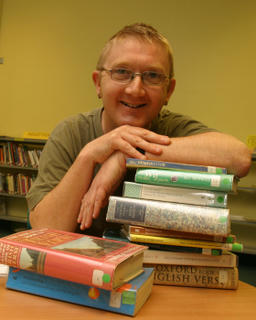commentary on Ceasefire (Newry Library)

From 10.30 - 12.30 I inside the entrance to Newry Library. There is a wide gap as you come in and I set up table to the left with a pile of poetry, note pad and pen.
If I could lure people over I'd give them three options for the project.
a) talk to me about Newry
b) choose a favourite poem (and I'd read it)
c) create a poem
Some whisked by, quite pleasantly. It was a Monday after all. Nobody was grumpy and I do believe that what one of the stayers said was true; the people of Newry did have a worldwide reputation for being friendly.
One man, researching the canals, stopped to talk about the poem Ceasefire which although not written about this part of Ireland's history, did carry a strong symbolic content and link. Interesting to note, in the 26th August edition of Newsletter, John Maxwell, father of a teenager blown up by an IRA bomb has sent out a plea to meet his son's killer. I asked him to write his commentary down (I'm a pushy bugger!)
Although not written about the N.I ceasefire I was very moved my the words and theme of Longley's poem Ceasefire.
The poem is based on the war of Troy when the warrior Achilles and his troops invade Troy and during the war Achilles killed Hector, son of the old king Priam.
In the first verse, the old king Priam goes to Achilles to cry for the return of his son's body in order to give him a decent burial.
When Achilles looks down on the old king he is reminded of his own father. The two men are overcome with sadness and the building is filled with tears.
In the second verse, Achilles takes Hector's body in his own arms, cleans the body for the old king's sake. The king then carries his son's body home for burial.
In the third verse, after this unbelievable gesture of forgiveness and charity both men sit and eat together. A scenario which never could have been thought of before.
In the final verse, King Priam showed a great gesture by getting down on his knees and kissed the hand of Achilles, the killer of his son.
When I read this poem, I thought of Sir Gordon Wilson who lost his most precious gift from God, his daughter. But he found it in his heart to not only forgive her killers but actually sat down at the same table and asked them to stop their campaigns. I also thought of the families of the forgotten and how they would give anything to find their loved ones and give them a dignified burial. I hoped if anybody having read this poem knew anything of the whereabouts of these remains they, like Achilles, provide the information so the families can take their loved ones' bodies home and give them a dignified burial. And then these families, hopefully in time, will find it in their hearts to forgive their killers.
I would like to hope as in verse three of the poem, the warring sides would sit together because it is only by sitting together, talking together and forgiving each other for out past mistakes, that we can live in peace.

<< Home